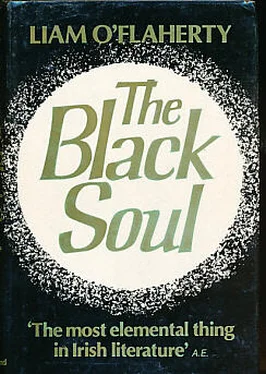He heard sounds of music coming from O’Daly’s cottage as he approached. He stood in wonder listening, drinking in the delicious sound that always intoxicated him. He realized this was classic music and he wondered who was playing. ‘It’s a violin,’ he said. He became jealous of O’Daly for being able to play so well, for he himself could not play and he hated anybody being able to do anything which he himself could not do. He swore and knocked at the door. He waited for two minutes, but no answer came. The music still continued. Then a woman’s voice began to accompany it. ‘Ha, that’s his daughter,’ he said, and his heart began to throb. Her voice was sad and sweet. It seemed to mingle with the sounds of the wind and the sea. It would go forward for a space softly, sibilantly. Then it gathered strength and rose in a thickening wild cascade of sound, like a wave ridden by the wind breaking against a cliff. Then another clear note joined it at the height, a note of fierce unconquerable pride, that wound whirling steel bands about it. And immediately it fell, lower and lower, laughing, tingling, as if it were shivering in an ecstasy of ferocious joy, like the voice of a mad woman laughing over the dead body of her lover. A frenzy of passion rose within him as he listened. He longed to grasp a sword, to smite mountains, to heave huge weights, in order to exhaust the energy born in him by the music. He ran down the path away from the house. But as soon as he was out of reach of the music he stopped, snorting. He leaned over the gate, his perspiring body chilled. He looked back at the house as if it concealed enemies. He trembled with fear, thinking it was enchanted. The moon and myriads of stars made the night bright. The thatched cottage stood out clearly against the face of the low hill behind it, where the crag ended in a glen. The glen was covered with a shadowy mist, the gaunt bare trees standing about in it. He could hear the dull rumble of the spring water dripping from the base of the ivy-covered rock to the left. The roof of the cottage hung low, as if it staggered under its thatch. The rain had stained the yellow paint on the walls. Withered rose bushes lined each side of the little portico. ‘Hell, I’m silly!’ he said. ‘I’ve seen hundreds of cottages like that. I’ll go in.’
He walked steadily up to the door again and knocked. The music stopped. He heard a chair upset and then the door opened. O’Daly’s daughter faced him in the hall. A lamp swinging over her enveloped her head in a bright light. Stray tresses of auburn hair rose quivering in the wind from the huge coil that lay banked about her forehead. They glistened as if sparks of fire had fallen from the lamp on them. Her eyes were just like her father’s, blue, gleaming, fierce, cold eyes. Her face was like her father’s. The lips were thin and compressed. The nose was straight and the nostrils were slightly distended. The rest of her body was slight. In her right hand she held the violin she had been playing.
‘You are heartily welcome,’ she said, bowing slightly. Her voice was cold, almost sharp, totally unlike the voice he had heard singing a minute before.
He said ‘Thank you’ and followed her into the sitting-room on the right.
The sitting-room was low-roofed and large. A turf fire burned brightly in a large black grate. A French window, with sloping bays, almost covered one side. A reading-lamp rested on a round mahogany table in the centre. The remaining walls were lined with books. The picture of a fierce-looking man, wearing sidewhiskers, hung over the fireplace. Evidently an O’Daly, and an ancient one, for he wore ruffles. O’Daly’s head appeared over the back of a leather-covered armchair that was drawn up in front of the fire. The toes of his right foot, covered with a grey sock, also appeared over the back of the chair. It was resting on the low mantelpiece. O’Daly did not rise, but he wheezed and groaned, as he apologized for not rising. ‘Rheumatism … Meet my daughter Kathleen … nearing my last … heard you had the doctor … sorry to hear it … an awful scoundrel … take your chair to the fire … get that bottle of brandy, Kathleen.’
The Stranger sat opposite O’Daly. He cast a hesitating look after Kathleen as she walked slowly to the door, strumming her fingers along the table as she passed. He noticed she was wearing a knitted saffron dress, with a deep black band around the waist. Her slim body was as lithe as the body of a wild animal. The length of the fingers that strummed along the table made him stare after her, as she disappeared through the door. There was a deep hollow in the back of her neck beneath her piled-up hair and the hair grew thickly each side of the hollow. As he looked towards O’Daly from her he blushed. She was the first educated woman with whom he had come in contact for a long time. In fact he had never known the companionship of educated women. The kind who gave their love easily attracted him more. ‘They were less waste of time,’ he used to say. Now he felt embarrassed and attracted. He also felt ashamed of himself. He was looking at O’Daly for several seconds before he could see the man. O’Daly was making peculiar grimaces, jerking his face upwards slightly with his upper lip curled. Then he leaned over and whispered, grasping the Stranger’s right knee, ‘Be careful what you say. She is very religious. Gives me dog’s abuse for swearing. I declare to Christ the women nowadays … whist! here she comes.’
Kathleen entered the room with a tray, carrying a bottle and two glasses. As she filled the glasses in silence, she made grimaces as if the smell of the brandy were stifling her. She handed a glass to each of them and then sat by the table holding her handkerchief to her mouth.
O’Daly, with his glass half-raised to his lips, looked at her half-mournfully, half-fiercely, like an old dog after being beaten by a young master, and then he said, ‘Phew. Here’s a good health, Mr. O’Connor.’ He drank. ‘My daughter is a temperance woman,’ he added. Kathleen shrugged her shoulders with a sigh, and they both looked at her. But nobody spoke. O’Daly swallowed the contents of his glass, but the Stranger put down his glass almost full. He knew Kathleen was watching him and he became oppressedly conscious of the dilapidated state of his clothes, his worn features, and … though he hated to admit it … of his sinful past. Then he began to talk to her; casually at first, while O’Daly glared furiously at each of them, cracked his fingers, made a noise like a man urging a horse, and swore under his breath, trying to find a more comfortable place in his chair. He was like a fish out of water in the presence of his religious, cultured and highly civilized daughter. But the Stranger, as soon as she began to talk to him, felt a stiffening that drove out his embarrassment. There was an aggressive yet pitying tone in her voice that maddened him. ‘You’ve been to the University,’ she said, rubbing the fingers of her right hand slowly along the back of the left.
He felt she was patronizing him.
‘Yes,’ he said curtly, ‘I spent a few years in that den of superstition before I had sense enough to begin my education properly.’
O’Daly laughed loudly and then swore as he stubbed his toes trying to sit upright.
‘Damn right,’ he yelled, waving his beard in an ecstasy of self-enjoyment, ‘the only place to learn is …’ And then he stopped dead, meeting the cold stare of his daughter. He dropped down into his chair until only his arms protruded.
Kathleen looked at the Stranger with a half pitiful, half-contemptuous look. She looked from under her eyelashes and seemed to shiver inwardly in horror of such a statement.
‘Oh,’ she said, ‘I see.’
The Stranger fumed. He understood quite well that she said several things after the manner women have of saying a thousand bitter things in a silent glance. She said, ‘You have been in the British army and therefore you are an enemy of your country,’ since she, like all cultured young Irish women, was a Nationalist for the same reason that similar types in other countries are suffragettes or followers of nature-cults or social reformers, to express their newly discovered sex freedom. She said, ‘You are a pariah since you have lost your religion,’ for as a cultured young Irish woman, the Christian religion was to her an emblem of purity, sex freedom, and a bulwark against everything gross and foreign. And the Stranger, even though his reason despised both Nationalism and Christianity as relics of the childhood of human thought, felt himself in the position of a man accused by his own family of heinous crimes against the family honour.
Читать дальше












